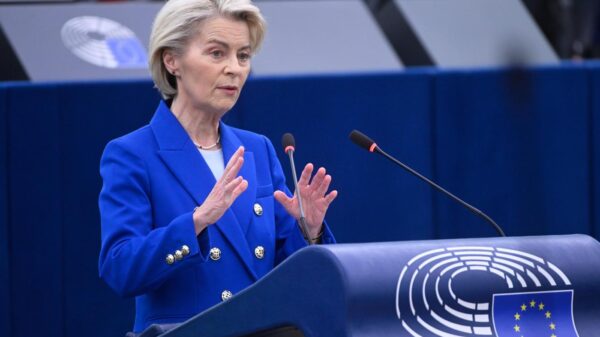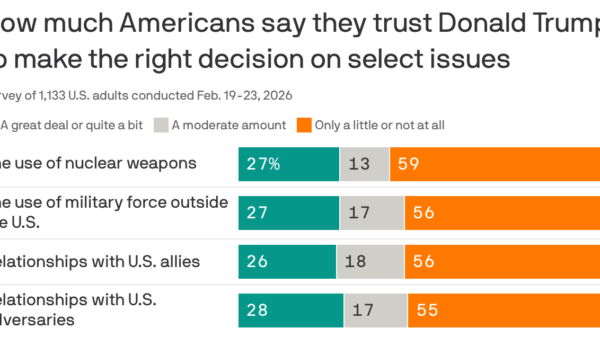The United States is poised to enhance its influence in the Middle East through energy dominance, potentially surpassing China’s growing presence in the region. This shift comes as geopolitical tensions, highlighted by the ongoing conflict in Gaza and other regional crises, expose the limitations of Chinese and Iranian power. With a focus on energy exports and strategic partnerships, U.S. policymakers are looking to reshape the dynamics of influence in the Middle East and beyond.
Energy Diplomacy Shifts the Balance
The shale gas revolution has positioned the United States as a global leader in natural gas production and exports, significantly impacting the energy landscape in the Middle East. U.S. liquefied natural gas (LNG) is rapidly becoming a preferred resource for countries facing energy crises, particularly in Europe and Asia. U.S. prices are approximately one-third of those in Europe, providing an attractive alternative for nations seeking stability amid fluctuating global energy demands.
Gulf Arab states, such as Saudi Arabia and the United Arab Emirates, have traditionally relied on Western markets for their hydrocarbon exports. As U.S. gas exports increase, these nations are likely to foster closer ties with American energy firms rather than Chinese counterparts, given the geopolitical advantages the U.S. offers. This shift in energy diplomacy allows the U.S. to assert its influence, compelling Gulf states to align their interests more closely with Washington.
To maximize this emerging opportunity, U.S. policymakers are encouraged to implement targeted financing initiatives. Such plans could support joint ventures in nuclear and gas infrastructure in countries like Turkey, Jordan, and Egypt, which are wary of becoming overly reliant on Chinese or Russian investments. The proposed collaborations would involve technology transfers, nonproliferation agreements, and research partnerships, further entrenching U.S. energy influence in a region ripe for engagement.
Nuclear Power as a Strategic Lever
The U.S. remains the world’s foremost nuclear power generator, possessing advanced reactor designs and regulatory expertise. President Trump’s administration has proposed significant expansions to nuclear capacity, aiming to enhance America’s energy portfolio while boosting its global standing. By establishing nuclear partnerships with nations in the Middle East, the U.S. can solidify its influence through comprehensive energy agreements that encompass supply chains, training, and rigorous oversight.
Countries like Saudi Arabia and the UAE are exploring nuclear energy to diversify their energy sources. Collaborating with the U.S. can provide these nations with greater assurance of reliable energy while adhering to stringent diplomatic standards. The contrast with Chinese nuclear initiatives, which often lack transparency and safety assurances, positions the U.S. as a more dependable partner in the eyes of Gulf states.
Taiwan stands as a cautionary example of energy policy missteps. Its recent decision to phase out its last nuclear reactor in May 2025 has plunged the island into a dependency on costly imported LNG, which now constitutes 98% of its energy needs. Critics argue that this shift compromises Taiwan’s energy security, exposing it to vulnerabilities that could be exploited by larger powers, particularly China. The estimated annual cost of this policy could reach nearly $2 billion by 2030, a significant burden for the nation.
The implications of U.S. energy engagement extend beyond the Middle East and could reshape the geopolitical landscape in Asia. A strong American presence in Gulf energy markets can help secure alliances with nations bordering Iran, fortifying their ties to the U.S.-led order while reducing reliance on Chinese investments.
As energy politics evolve, it is clear that the U.S. has the potential to leverage its energy abundance to diminish China’s influence in the Middle East. By establishing strategic energy partnerships, the U.S. can offer a blend of economic cooperation, military support, and digital infrastructure development that Beijing’s more transactional approach cannot match.
In conclusion, the U.S. must prioritize energy collaboration with key partners while encouraging Taiwan to reassess its energy strategy. Embracing small modular reactors where feasible could enhance Taiwan’s energy autonomy, providing an essential buffer against external pressures. Ultimately, energy policy is a powerful tool in shaping geopolitical relations, and the U.S. is uniquely positioned to wield this influence in the coming years.






































































